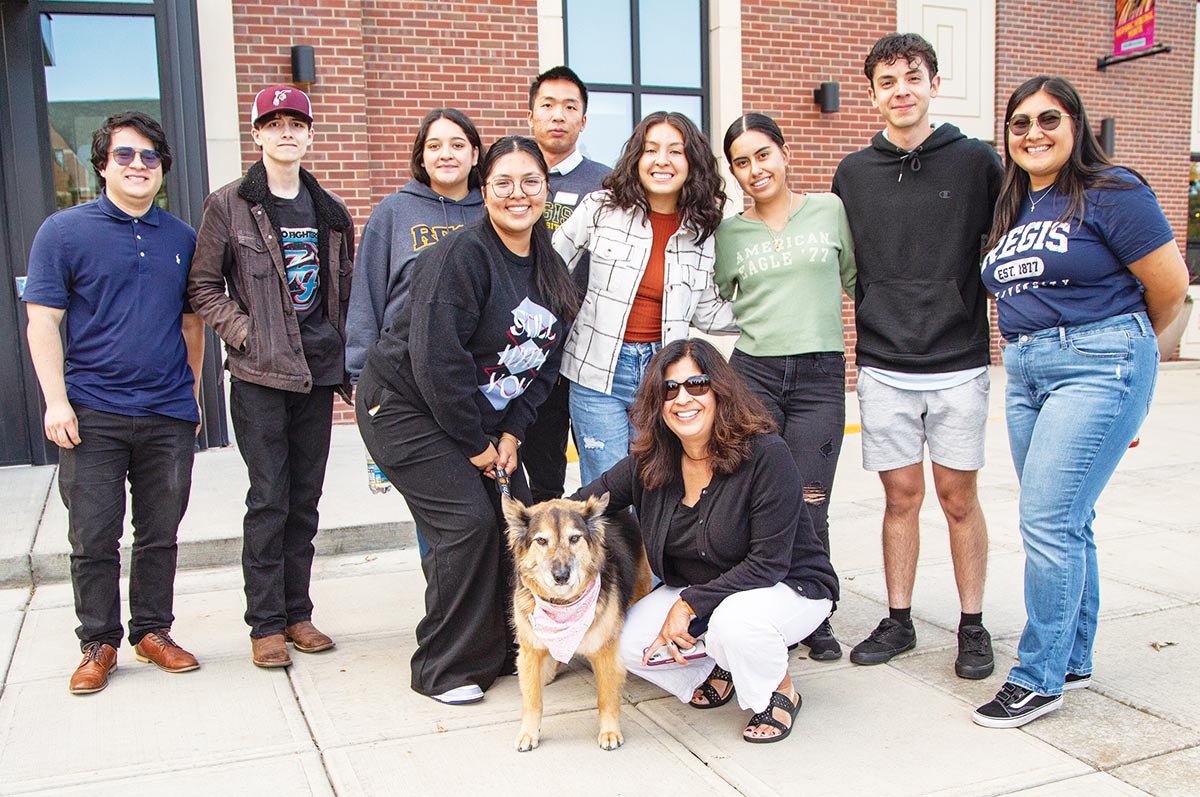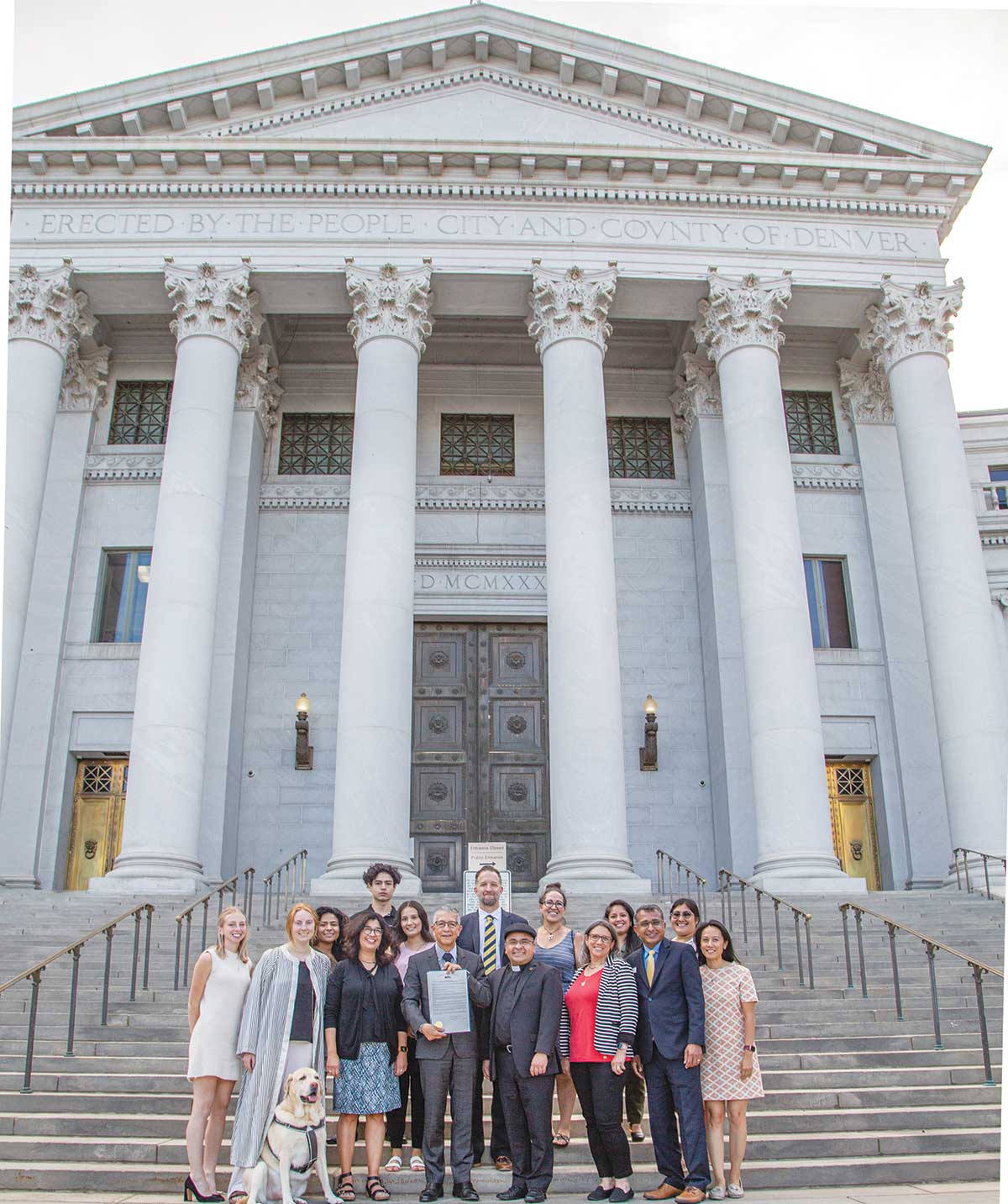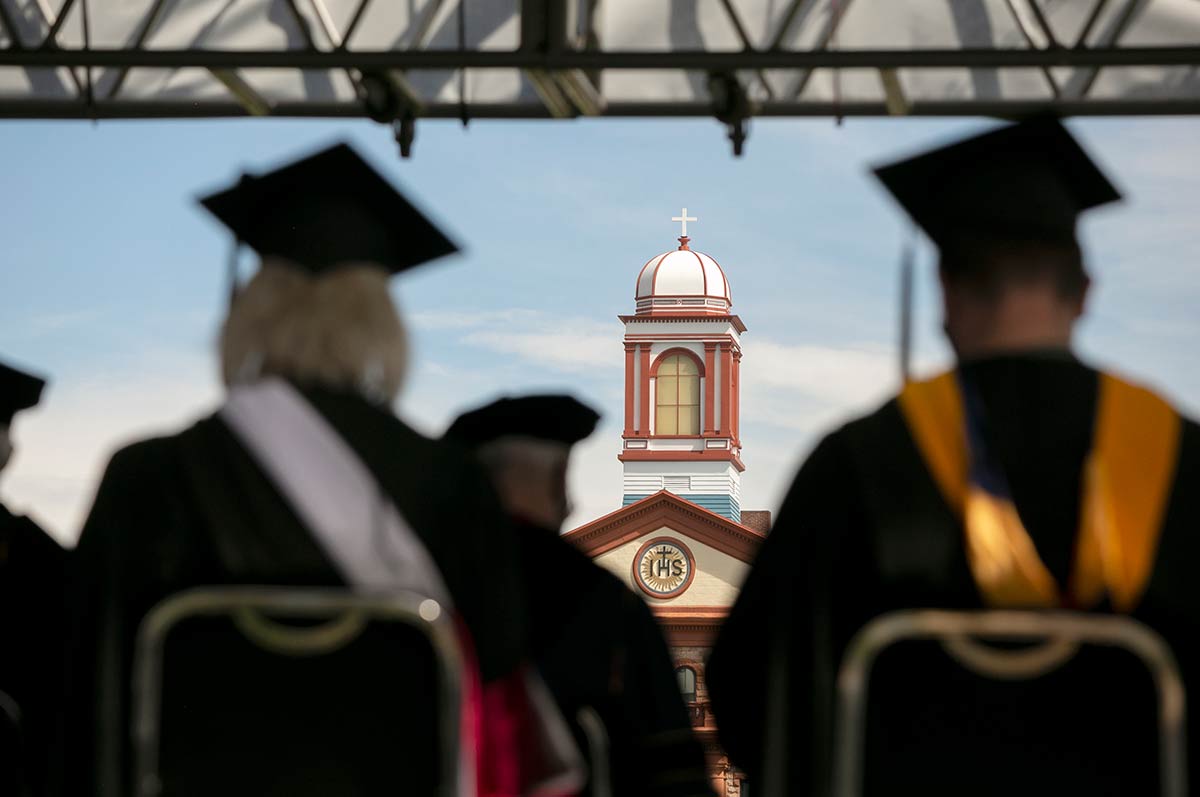Dreams Realized
Becoming a Hispanic-Serving Institution expands opportunities for Regis and its students

Alma Borunda-Granillo's 21st birthday was nothing like she had imagined.
Not that she pictured spending the day the way many 21-year-olds do. While her friends got excited about going to bars and ordering their first legal drinks, the then Regis student just wanted to start her parents on the road to U.S. citizenship, something she already had and something that, once she reached 21, she could help them get.
But after a legal battle that resulted from a misunderstanding, Borunda-Granillo’s parents lost their jobs and began to frantically pack up their Denver home. The parents she’d hoped would soon become citizens instead found their future lives in the United States jeopardized and feared they would have to go back to Mexico. Her own dreams – of finishing her Regis degree and building a career helping immigrants in this country — seemed about to vaporize.
That’s when she turned to the University for support. She had reason to think Regis would help. In the months before her 21st birthday, when her family’s legal battle was still ongoing, she appreciated Regis’ services.
“Every semester, I would have to start the conversation with, ‘Hey, I might miss a few classes because I have to go translate for my parents,’” she said. “I saw a lot of the professors cared and it just led to me having a deep understanding with them. It's like a teacher and student bond but at the same time, it went far beyond that. They can see your human side and kind of help you through it.”
A Means to Help All Students
Beginning this year, Regis can offer even greater support to students who come after Borunda-Granillo, who graduated in spring 2023. In March, the University was named a Hispanic-Serving Institution (HSI), a federal designation that brings with it new opportunities for students, faculty, and staff, including the ability to apply for additional federal grants, fellowships, internships and research funding.
It also provides Regis with an opportunity to serve the state’s growing Latine student population.
As of 2022, some 22.5 percent of Colorado residents were of Hispanic origin, and 22 percent of them were under 18, according to the U.S. Census. What’s more, the UCLA Latino Policy and Politics Institute reports that Colorado’s Latine population grew by 72 percent between 2000 and 2019 — twice the state’s overall population growth.
To qualify for HSI designation, Hispanic students must comprise at least 25 percent of a university’s undergraduate enrollment.
Nicki Gonzales, Ph.D., vice provost for diversity and inclusion and a Regis professor of history, said the status links the University with a network of peer institutions that can offer guidance. It means that Regis has joined fewer than 600 colleges and universities nationwide with the designation. Of the nation’s 27 Jesuit universities, only one other— Saint Peter’s University in New Jersey — has achieved HSI status. Regis is the only private institution in Colorado with the designation.
For students, the new status also means more support from offices such as the Office of Diversity, Equity and Inclusive Excellence.

A Status That Benefits Everyone
For Regis, the path to HSI status was a collaborative effort, with the entire campus community contributing.
In its first year as an HSI, the University will work to ensure the campus is inclusive and welcoming, from writing signage in multiple languages to ensuring students have access to a culturally responsive faculty, staff and board of trustees. The University also will continue to engage with families and to create a culturally enhancing educational experience.
Regis also has worked closely with other HSI universities. Colorado State University-Pueblo, an HSI since 2005, has offered advice — and praise — to Regis as it enters its new status.
“They said, ‘Your mission is so compatible with HSIs. You don't have to convince your administrators that this is valuable because they already buy into your vision,’” Gonzales said. “And so that was really encouraging. It’s just nice to have partners in the work who aren't competitive with us, but who want to serve the community because that's what we do.”
While the University has become an HSI, the call to serve Latine students goes much further back than this past spring.
A History of Service
More than a century before it earned its new HSI designation, Regis made a commitment to serve students who were Indigenous and Hispano (people descended from Spanish settlers before territories were annexed into the United States). In fact, that’s why Jesuit priests founded the University in 1877, as Las Vegas College in northern New Mexico.
Gonzales, a former Colorado State Historian, said the University began by educating the Native and Hispano residents of the land. In the next several years, Regis evolved, moving its campus from New Mexico to Morrison, Colo., and then to the current Northwest Denver Campus in 1887.
“Those are our roots. And then over time, you see, especially with the move to Denver, Regis has reflected the history of the city, where we have Irish immigrants, and then we have Italians and Southern and Eastern European immigrants. Catholic communities that sent their kids here,” Gonzales said. “And over the years, it has become more and more welcoming to the Latino community.”
Gonzales, who joined Regis in 2007, said that in the years since then, the community around Regis has reflected demographic changes in Denver.
“We have these huge shifts politically, economically and, and power-wise in the city of Denver in particular, that really have moved in favor of this,” Gonzales said. “I think, in many ways, Regis is a microcosm of these different shifts, these larger shifts, and we benefited. And it shows that Regis is very integrated into the local community in ways that cause us to reflect those demographic shifts.”
The biggest demographic shift, she said, comes from the influx of migrants and immigrants from Latin American countries.
“With that demographic in particular, college is a pathway to the middle class and to a good life,” Gonzales said. “And as the power shifts in state and local politics, communities are gaining access to college education.”
“College is a pathway to the middle class and to a good life. And as the power shifts in state and local politics, communities are gaining access to college education.”
- Nicki Gonzales, Vice Provost for Diversity and Inclusion
Regis added another chapter to that history this year when it named Salvador Aceves, Ed.D., as its first lay and first Latino president. His appointment was announced just months before the University was officially designated as an HSI.
When Aceves was inaugurated as Regis’ 27th president in September, he highlighted the designation as an example of Regis’ commitment to serving a diverse population.
“I stand before you for the whole and grateful heart,” he said during his inaugural speech. “My grateful heart reflects my love for Regis University, a school initially established in 1877 to serve the Hispanic and Native peoples of the New Mexico territory. Regis is now a Hispanic-Serving Institution, a designation we received on March 30 of this year. It is a designation that reaffirms how Regis University reflects the community it serves.”
Meeting a Growing Need
Indeed, HSIs nationwide serve more students within the demographic than any other. Two-thirds of all Hispanic college students in the United States attend an HSI, according to a 2023 White House proclamation honoring the impact of schools with the designation.
“They provide a quality education and empower underserved students — including Dreamers and first-generation college students — to earn degrees and build better lives for their families,” the proclamation read.
The idea of designating HispanicServing Institutions emerged after the post-Civil Rights era and grew through efforts by the Hispanic Higher Education Coalition, which intended to address academic achievement gaps among Hispanic students. The Hispanic Association of Colleges and Universities formed in 1986, and in 1998, the organization successfully lobbied for the creation of a national HSI program.
A major charge of the HSI initiative nationwide is to ensure that more students have access to higher education. According to the Cornell University Law School Legal Information Institute, Hispanic Americans “are at high risk of not enrolling or graduating from institutions of higher education.” According to the institute, “Disparities between the enrollment of non-Hispanic white students and Hispanic students in postsecondary education are increasing.” It reported that between 1973 and 1994, enrollment of white students in institutions of higher education increased at a rate two times higher than that of Hispanic students.
The impact of HSIs is felt nationally. In a report presented to the U.S. House of Representatives, Jose Luis Cruz Rivera, president of Northern Arizona University, said, “Each and every one of the top 10 schools that offer the most economic mobility in the United States is an HSI.”
In general, according to Cornell, HSIs receive less federal funding than other types of higher education institutions. The supplementary funding, received through grants, helps universities bolster their support systems.
For many students, the need for support remains as strong as ever.

Help at a Critical Time
At the end of Borunda-Granillo's freshman year, a misunderstanding about her parents’ receiving government assistance led to an intense investigation. The investigation resulted in frequent visits by authorities to both parents’ workplaces. That, in turn, led to them losing their jobs.
Initially, her parents thought the best solution was to return to Mexico. They soon changed their minds, however. Their two kids’ education was too important, and Alma Borunda-Granillo was so determined to get her degree, and worked hard at it.
But the decision to stay wasn’t easy. Before the family’s situation got better, it got worse. After her parents lost their jobs, the family lost its home.
By her sophomore year, as the COVID-19 pandemic upended the world and pushed college courses online, Borunda-Granillo didn’t have a home for a couple of months. She lived — and attended classes in — her car while her family looked for a place to live. When the pandemic began, Borunda-Granillo and her family were well aware of something many people, cooped up in their houses, couldn’t imagine: how difficult it is to live without a home.
Her passion for justice inspired Borunda-Granillo to pursue two majors: Peace and Justice and Communication. So, while struggling and living in her car, Borunda-Granillo juggled taking 20 credit hours translating for her parents in court, trying to avoid missing too many classes, and helping her younger brother, who was in high school at the time, stay on top of his grades while he also worked to help support the family.
“When I took my Introduction to Peace and Justice class, I was really intrigued, and I remember seeing a documentary in class about immigration and how a person there helped translate for people at the border who needed help,” she said. “And I was like, ‘I need to do that. I'm going to do that someday. I'm going to help people.’”
During college, she often was living the subjects classmates learned about in class, such as homelessness. Borunda-Granillo said her passion for her major, family, and the Regis community kept her going.
“My family was definitely part of it, but I think also just having that sense of community with the professors and just seeing that you can still progress through all the hardships,” she said. “I just indulged myself in a lot of work, but a lot of it came down to just being passionate about what you're studying. For me, that was communication and peace and justice. I was able to apply a lot of what I was learning in class outside of class.”
Borunda-Granillo was able to get the support she needed — but Gonzales realizes there could be more students who need similar assistance. That’s where Regis’ new status as an HSI can help. The University has existing programs designed to assist first-generation students, including the First-Generation Student Success Program, the RU First Program, the Summer Bridge Program and 1Leads.
“HSI money will allow us to, one, reimagine those (programs), make them more effective, and grow them. We'll be able to build our capacity to serve more students,” Gonzales said. “And so, that's really exciting to think about how we might grow our programs.”
Being there for students like Borunda-Granillo aligns with this goal.

Determination Rewarded
Borunda-Granillo’s determination, grit and the support she received from Regis faculty and staff helped her not only graduate on time, but also achieve the highest levels of success in her class. Borunda-Granillo received the Byron Plumley Peace and Justice Award and the Human Communication Honor Award.
And she’s committed to helping other students. As part of her final capstone, she created a website that serves as a survival guide for other first-generation students, providing definitions for terms in higher education, such as “dormitories” and “academic advisor,” that help break down barriers. She also includes advice for applying for scholarships.
“It feels like I finally made it, and it was thanks to y'all,” Borunda-Granillo said, referring to her professors and the community of supporters she had at Regis. “I still struggle with saying it's thanks to me and the effort that I put in … it was such a moment of closure and instant happiness.”
While Borunda-Granillo’s family still faces hardships, they also had reason to celebrate in the past year. On April 30, when Borunda-Granillo spoke at her commencement ceremony, her parents were in the crowd to cheer her on. In October, she began working as the community organizer and garden coordinator with Growing Home, a nonprofit that assists Denver families with food, housing, parental education and more. They all are celebrating a dream achieved at last.



